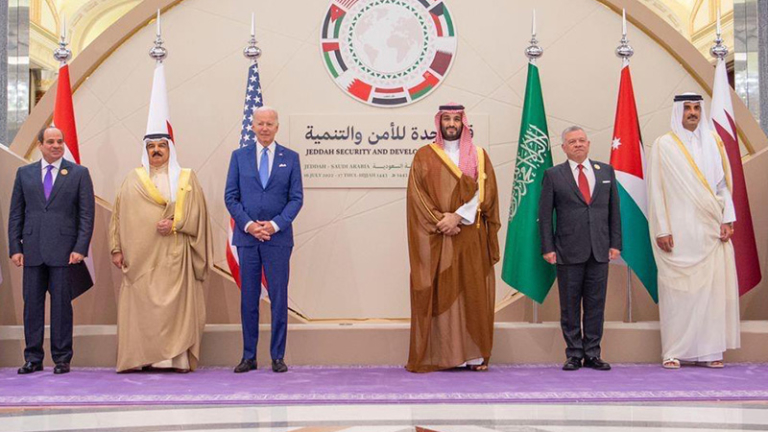
The first two years of the Biden administration, although short, have offered insight into the ways in which the reality of governing can clash with declared hopes and high-minded rhetoric about aims in foreign policy and relations with the Middle East. President Joe Biden campaigned on an agenda of ensuring accountability for human rights abusers in the MENA region and promoting democracy. But he has so far failed to live up to the discourse of his campaign and demonstrated a clear preference for continuing to see America’s interests through the lens and demands of relations with authoritarian regimes that violate human rights and democratic principles. Just as important, two years of the Biden administration have failed to check Israel’s severe and often illegal policies and practices against the Palestinians living under its military occupation, policies that are expected to become even more flagrant in the future given the ascendance of a far-right, religious-nationalist government under the leadership of Benjamin Netanyahu.
How will the Biden administration conduct itself in the Middle East in 2023? Will President Biden stay the course he has followed thus far or will he make substantive changes in US policy in the region? Could unforeseen factors emerge that would force the US government to act differently? These and other questions are the subject of the following series of contributions by Arab Center Washington DC’s fellows and affiliated experts.
In Palestine/Israel, If You Liked 2022, You Will Love 2023!
Khalil E. Jahshan, ACW Executive Director
On Thursday, December 29, 2022, Benjamin Netanyahu was sworn in as Israel’s 15th prime minister after several weeks of arduous political negotiations between the Likud Party and its ultranationalist and ultra-Orthodox coalition partners over the spoils of political victory from the country’s November 1 election. This is the sixth term as prime minister for Netanyahu, who already enjoys the title of Israel’s longest-serving head of government.
Netanyahu and his Machiavellian politics are not new phenomena to any keen observer of Middle East affairs. What is unprecedented, however, is the extremist nature of his coalition government, which includes individuals and political parties widely deemed in recent years as falling outside of the Israeli mainstream on both Israel’s domestic and foreign policy concerns, and particularly in their stance on the Palestine issue. The 33 cabinet ministers chosen by Netanyahu are a hodgepodge of extreme nationalists and religious fanatics that have not been found under the same political umbrella in Israel since the country’s inception. The likes of Bezalel Smotrich, Itamar Ben-Gvir, Aryeh Deri, Miri Regev, Avi Dichter, Idit Silman, and Avi Maoz, just to name a few, are all quintessential poster children for Israeli fascism, racism, and religious bigotry, and are broadly considered to be far to the right of Netanyahu, the modern-day Attila the Hun of Israeli right-wing politics.
To his credit, Netanyahu realized early on the dangers of the ticking time bomb that he has assembled, and therefore moved swiftly to alleviate regional and global fears by downplaying the extremist nature of his cabinet partners and assuring friends and foes alike that, “The other parties are joining me. I’m not joining them.” Tragically, Netanyahu went on to channel former US Secretary of State Alexander Haig’s infamous faux pas following the attempted assassination of President Ronald Reagan by declaring, “I’m in control here.” That is precisely why many Israelis and their supporters around the world have expressed their concerns about Israel’s future. Israeli opposition parties, leaders of mainstream US Jewish organizations, human rights organizations, Israeli Air Force veterans, prominent Jewish academics, and even Israeli President Isaac Herzog have expressed their fears about the future of the country as they have known it for the past 75 years.
Netanyahu quickly added fuel to the fire, and particularly for the Palestinians, by releasing the basic tenets of his government’s political agenda, which are focused on the Jewish people having “an exclusive and unquestionable right to all areas of the Land of Israel.” His government, the agenda states, “will promote and develop settlement in all parts of the Land of Israel—in the Galilee, the Negev, the Golan, Judea and Samaria.” Netanyahu’s subsequent declaration in response to a December 31, 2022 UN General Assembly vote on the Israeli occupation of Palestine, in which he stated that “the Jewish nation is not an occupier in its own land and its own eternal capital, Jerusalem,” is tantamount to a declaration of war on all Palestinians, whether in Israel, the West Bank, East Jerusalem, the Gaza Strip, or in the diaspora. Far-right Israeli legislator Zvika Fogel was less diplomatic than Netanyahu, stating, “As of right now, the occupation is permanent. And as of right now I would like to continue to apply Israeli sovereignty over all the areas that I can.”
Clearly, Netanyahu has set the stage for the next war in the Middle East. This essentially transforms the problem from a local and regional political issue into a direct challenge for the Biden administration, which is not prepared for any additional conflicts in the region, regardless of Israeli dictates. Mr. Biden considers the results of the latest Israeli election and the return of Netanyahu as the head of an extremist government to be a setback for his limited but specific objectives: securing a steady supply of oil from the region, maintaining relative quiet in the Palestinian territories, achieving a nuclear agreement with Iran, and obtaining cooperation from regional partners in confronting Russia in its war on Ukraine. These national security objectives, as limited as they are, will not be achieved by simply dispatching National Security Advisor Jake Sullivan to placate Netanyahu or by additional diplomatic soft-pedaling by Secretary of State Antony Blinken.
Business as Usual with Egypt
Khalil al-Anani, ACW Senior Fellow
Over the last two years, the Biden administration has strengthened its relations with Egypt. President Biden met with Egyptian President Abdel Fattah el-Sisi three times in 2022: during Biden’s visit to Saudi Arabia in July, at the COP27 climate conference in November in Sharm el-Sheikh, Egypt, and on the sidelines of the US-Africa Leaders Summit which was held in Washington, DC in December. These meetings run contrary to Biden’s 2020 presidential campaign promise to not give more “blank checks” to Sisi, former President Trump’s “favorite dictator.”
The Biden administration’s policy toward Egypt has not been different from those of previous administrations, which viewed Egypt as a key strategic partner in an increasingly troubled region. For its part, Cairo has proven itself to be a cornerstone of US interests in the region over the past couple of years. It brokered a ceasefire between the Israelis and the Palestinians after a bloody Israeli war on Gaza in May 2021—which prompted President Biden to hold his first phone call with Sisi to thank him for his efforts in securing the ceasefire—strengthened its bilateral relations with Israel, and maintained a long-standing policy of securing American warships’ expedited access to and passage through the Suez Canal.
Washington and Cairo have managed to overcome their differences on the issues of human rights and democracy and to minimize these matters’ impact on their strategic partnership. This has been evident since Biden first took office in January 2021, having since occasionally raised the issue of Egypt’s gruesome violations of human rights with his Egyptian counterpart and having withheld a small portion of US military assistance to Egypt, but without significantly hurting the two countries’ bilateral relations.
Therefore, it is unlikely that there will be any significant changes or a policy shift in Washington’s approach to Egypt in 2023. In fact, bilateral relations are likely to be strengthened in the coming months, particularly in light of the ongoing global crisis caused by Russia’s war on Ukraine and growing tensions between the US and China. The Biden administration will likely be very keen to maintain strong relations with its Middle East partners, and particularly with Egypt, and will avoid creating any problems that might affect said relations. It will also continue paying lip service to the issue of human rights and democracy while maintaining business as usual with Cairo.
Pragmatic Adaptation to Relations with the Gulf
Kristian Coates Ulrichsen, ACW Non-resident Fellow
When the Biden administration entered office in January 2021, it appeared to give low priority to the Gulf Arab states and instead concentrated its policy focus on the Iran nuclear deal and the war in Yemen. Relations between the White House and several Gulf rulers were overshadowed by statements made during Biden’s presidential campaign, notably his declaration that he would make Saudi Arabia a “pariah.” The past year has changed those initial calculations as fallout from the Russian invasion of Ukraine re-emphasized the Gulf states’ centrality in the global energy landscape and prospects faded for a revival of the Joint Comprehensive Plan of Action (JCPOA) with Iran. To its credit, the administration responded to this change in circumstances and re-engaged with partners and allies in ways that differed from the (perceived) chaos of the US withdrawal from Afghanistan in 2021. The White House has accepted that its Gulf partners do not view Russia or China through the prism of great power competition or the lens of strategic rivalry.
This pragmatism has extended to the Gulf as well, even though the president’s visit to Saudi Arabia in July 2022 was not altogether successful. That said, 2023 will likely see more outreach by the administration to its partners in the Gulf with a focus on technocratic aspects of cooperation that are less vulnerable to flareups in political tensions. The sense of pragmatic adaptation will also be evident in the administration’s policy toward Yemen, which has evolved since 2021 to reflect the fact that it is the Houthis, rather than the Saudi- and Emirati-led coalition, that has become the primary obstacle to any resolution of the conflict. The administration will continue to engage closely with the Saudis and Emiratis on Yemen and to work through other Gulf partners, such as Qatar and Oman, to try and “manage” tensions with Iran in the absence of a return to the JCPOA or a definitive walking away from the prospect of dialogue by either side.
One thing to watch closely in 2023 is whether UAE President Mohammed bin Zayed (MBZ) will take up the invitation President Biden made to him during their meeting in Jeddah in July 2022 to visit the White House. The time frame for a visit that Biden had hoped would happen before this year ended has already slipped past. It thus remains to be seen whether MBZ will choose in the coming year to make his first visit to the US in nearly six years.
North Africa Will Not Be a Priority
Amal Ghazal, Dean of the School of Social Sciences and Humanities, Doha Institute for Graduate Studies
North Africa has never been a top priority for US foreign policy, and nothing has changed or will change under the Biden administration in that regard. One must assess the region’s significance for the United States apart from that of the Middle East, despite any overlap that might exist between the two. At least three factors allow for a separate assessment: North Africa’s lack of proximity to Israel, the issue of the contested Western Sahara and the United States’ specific (and perhaps temporary) interest in it, and the strong French influence in North Africa. Thus, Biden’s recent attempts to reverse former President Donald Trump’s foreign policy direction and re-engage with the Middle East may not have a direct impact on North Africa. A similar approach should be adopted when assessing the significance of North Africa for the Biden administration in light of the recent US-Africa Leaders Summit. The inclusion of North Africa in the summit seems to be more related to Africa as Sub-Saharan Africa, given the United States’ attempt to counter China’s influence there, which has centered on investing in infrastructure and other economic sectors.
Ever since the attack on the US diplomatic station in Benghazi in 2012, the United States has shown a high degree of disengagement in North Africa. Several factors have been redirecting US foreign policy toward increased engagement at the global level, the global energy crisis being one of them. Two countries in North Africa should be of interest to the US: Algeria and Libya. However, the former retains special relationships with Europe, and the latter remains in a highly volatile political state, which is a deterrent for engagement. From a US perspective, neither country currently warrants special attention. Nor does Tunisia’s experiment with democracy since, rhetoric aside, democracy alone is not a significant enough impetus for a shift in American foreign policy. And any hopes among the international community that Biden would reverse Trump’s recognition of Western Sahara as part of Morocco have been dashed. The US and Morocco maintain a stable relationship and the Biden administration therefore sees no need to change the status quo.
Does North Africa need a deeper engagement from the Biden administration? Is there consensus among leaders in North Africa on this matter? And more importantly, would any change in American policy toward the region lead to any long-term solutions to the region’s economic and political woes? The current reality of US-North Africa relations makes all of this highly doubtful.
National Interest Takes Precedence over Concerns about Democracy and Human Rights
Yara M. Asi, ACW Non-resident Fellow
Just three months after the inauguration of President Biden, then newly confirmed Secretary of State Antony Blinken remarked that the president “has committed to putting human rights back at the center of American foreign policy, and that’s a commitment that I and the entire Department of State take very seriously.” It is hard not to return to these comments when considering what approach the Biden administration will take to human rights in 2023, especially when focusing on the Arab region. It is difficult to envision a significant change from the policies of the previous administration and of the first two years of the Biden administration, from Palestine to Yemen, Syria, Lebanon, Iraq, Egypt, Saudi Arabia, Qatar, and elsewhere. Instead, the administration is ignoring, obscuring, justifying, financing, and otherwise enabling some of the most flagrant human rights abuses, acts of corruption, and antidemocratic practices, which it should surely and loudly protest instead. This was plain to see in 2022, and there are no signs that there will be a change in 2023 that results in the administration’s genuine prioritization of human rights.
Of course, the United States has many complex and competing incentives and motivations that have long guided its decisions in the Middle East, and that, many argue, have ultimately led to policy choices that have increasingly destabilized the Arab states. This has been clear for the past century, and it will likely continue to be the case in 2023. With what is predicted to be a raucous 2024 presidential campaign on the horizon, and with the Democrats holding tenuous control of the Senate, it is unlikely that the Biden administration will want to make any moves to disturb the status quo in the Middle East, regardless of how much that supposed status quo is actually devolving into a less democratic and more repressive standard. For the oppressive and corrupt regimes in the region, this is great news. But for the oppressed and marginalized people living under them, the Biden administration’s lack of positive action will offer further evidence in support of the fact that, in the administration’s view, their lives are not as important as the geopolitical power that their leaders wield.
A Hands-off Approach in Conflict Zones
Imad K. Harb, ACW Director of Research and Analysis
The first two years of President Biden’s tenure have seen something of a hands-off approach to ongoing conflicts in the Arab world. This is due to a general preference in American policy circles for reduced involvement in world affairs. With the Republicans now taking control of the House of Representatives, the Biden administration will feel compelled to further curb its already limited engagement in areas of conflict around the world, and specifically in the Middle East.
In Syria, the United States has maintained a position that calls for a political solution to the country’s civil war, one that paves the way for a democratic transition from authoritarian rule. The administration continues to maintain a small military force in northeastern Syria that cooperates with the Kurdish-led Syrian Democratic Forces militia. But it is not expected that the Biden administration will be more involved in any new discussions about the future of Syria or the fate of the democratic opposition that the administration and its predecessors practically abandoned years ago.
In Yemen, US efforts to participate in finding a peaceful resolution to the conflict have been unsuccessful and appear to merely support the United Nations’ efforts there. Despite the administration’s early decision to ban the sale of offensive weapons to Saudi Arabia, its role in peacebuilding has been hampered by the Houthi rebels’ rejection of a US role in the country. It is unlikely that 2023 will present new opportunities for Washington to impact discussions on ending the conflict in Yemen.
Similarly, the Biden administration threw its support behind European and UN efforts to find a solution to the political stalemate in Libya, which has on many occasions led to military confrontations between the country’s disputing factions. In fact, the administration seems to want to maintain relations with both sides of the Libyan political equation: the Tripoli-based Government of National Unity led by Abdul Hamid Dbeibah, and the Tobruk-based government that is led by Fathi Bashagha and supported by the House of Representatives and General Khalifa Haftar.
Finally, in Somalia, the United States will most likely continue to support the government of President Hassan Sheikh Mohamud, especially as it fights the al-Qaeda-affiliated al-Shabab movement. Although the Biden administration did pressure Somali leaders to agree to a political compromise to end a constitutional impasse that marked much of 2021 and 2022, its role was mainly a product of its commitment to counterterrorism in the Horn of Africa, a commitment that will continue in the coming year.
Featured image credit: SPA






